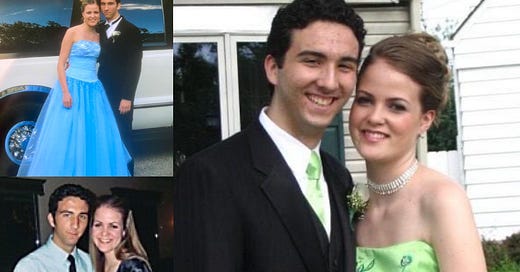
Wear is the Love, Episode 15
In this week’s episode, we felt our listeners might want to know a bit more about us, Melissa and Michael, as a couple. How did we meet? How did we start dating? I (Melissa) love telling this story because it’s all a bit cute, sweet, and hilarious.
In the second part of the episode, we discuss the op-ed from Yuval Levin titled, “Why Do Our Politicians Keep Pursuing a Losing Strategy?” Levin proposes that political parties need to start focusing on new questions and issue areas, and we have some thoughts.
The Top 5 articles for your week
“Ukraine: Apparent War Crimes in Russia-Controlled Areas” (Human Rights Watch)
Because this astounding report from HRW came out today and it’s making waves in the media — there’s evidence that Russia is allegedly committing terrible war crimes.
“The Battle for the Mural — and the Future of Belarus” (NYT Magazine)
Because this is an excellent story of courage in the face of authoritarianism in Belarus.
“Forced to Care” (Culture Studies - Substack)
Because “What we have, then, is a caregiving paradigm — not just for kids, but for elders and other adults — that relies heavily on proximity to family and presumed willingness. For those without those things, there are two options: 1) pay a lot of money for help, or 2) figure it out your damn self.”
“How an Ivy League school turned against a student” (The New Yorker)
Because this story about Mackenzie Fierceton’s horrific childhood and the subsequent issues she faced with her Rhodes Scholarship and tenure at University of Penn show how we assume stories of trauma conform to stereotypes and statistics. “If trauma creates a kind of narrative void, Mackenzie seemed to respond by leaning into a narrative that made her life feel more coherent, fitting into boxes that people want to reward. Perhaps her access to privilege helped her understand, in a way that other disadvantaged students might not, the ways that élite institutions valorize certain kinds of identities. There is currency to a story about a person who comes from nothing and thrives in a prestigious setting. These stories attract attention, in part because they offer comfort that, at least on occasion, such things happen.”
“My Friend Goo” (Paris Review)
Because this is an absolutely heartwarming and heartbreaking story, somehow, about the relationship between a woman and a goose and how their relationship connects to the death of her younger brother.







Share this post